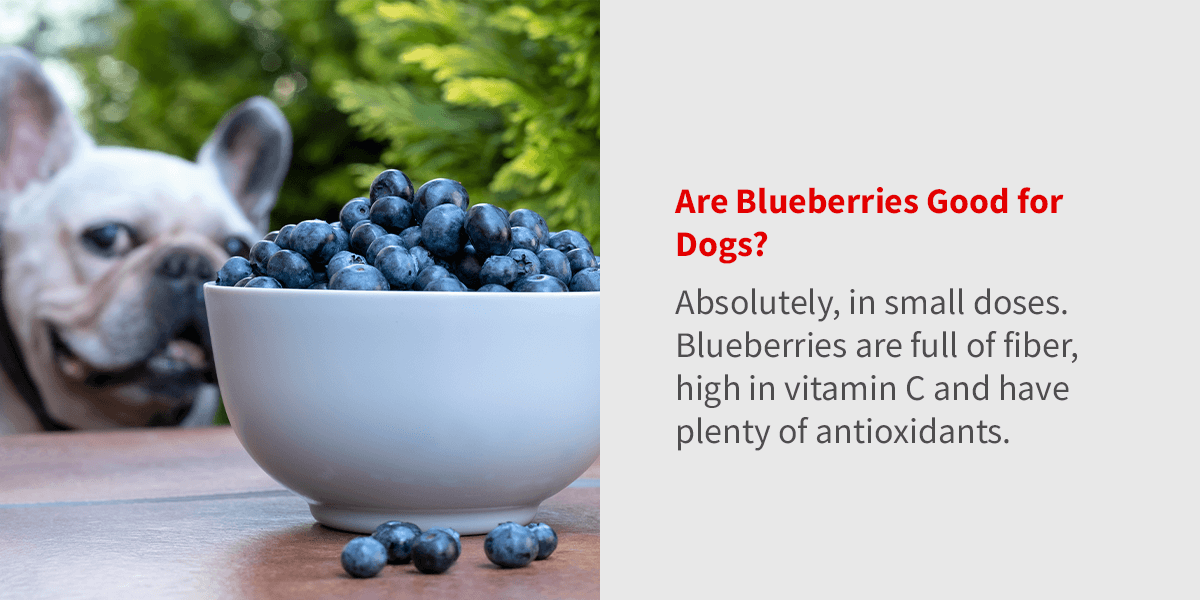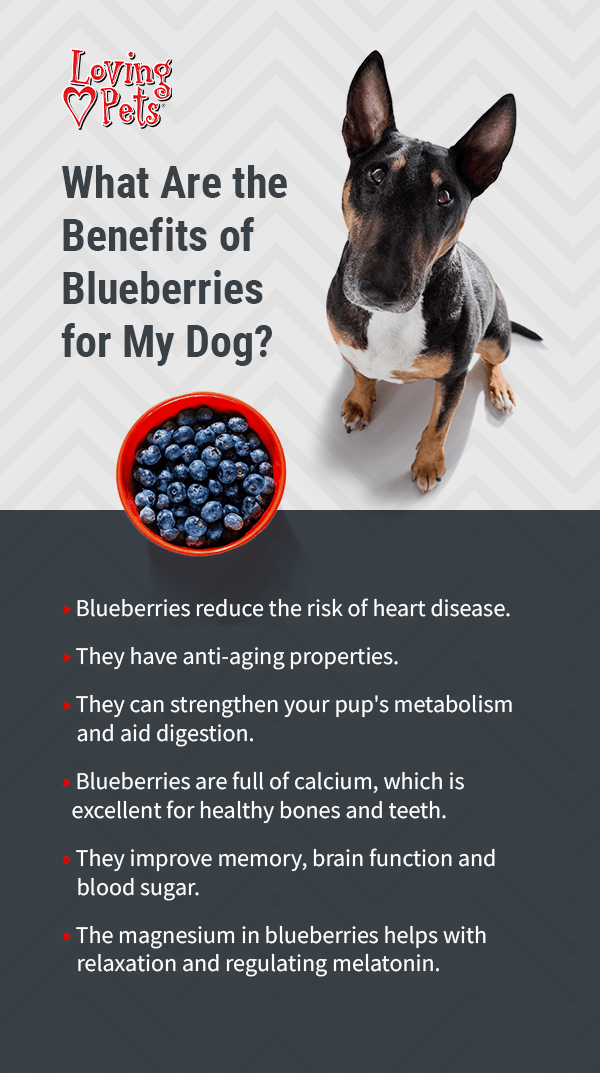The Benefits of Blueberries for Dogs
Humans love blueberries, and so do dogs! A recent study showed wolves feed their puppies blueberries to aid digestion and provide healthy vitamins. These antioxidant-packed blue fruits have tons of nutritional value to offer your dog.
If your dog seems interested in your blueberry snack bowl, offer them one to see if they'll take a nibble. Dogs enjoy various fruits and vegetables. Be sure to stick with the safe choices listed below.
There are many benefits to adding blueberries to your dog's diet, but check with your vet before making any significant dietary changes. Blueberries are a treat, so only serve them in moderation.
Are Blueberries Good for Dogs?
Absolutely, in small doses. Blueberries are full of fiber, high in vitamin C and have plenty of antioxidants. Many detox diets for humans include blueberries for that very reason. Antioxidants fight free radicals that are responsible for cellular and molecular damage in the body. They also help with the effects of aging in the brain — something to consider if you have a senior dog.

What About Blueberry Skin?
Dogs can eat whole blueberries, including the skin. Here are some tips for feeding your dog blueberries.
- Fresh: Wash fresh berries and remove their stems. You can sprinkle a few in your dog's food dish or try them as a treat.
- Frozen: Frozen blueberries are delightful on hot summer days.
- Mashed: Mash up blueberries to add to your pup's regular food. Mashed blueberries are also safe for small dogs, as blueberries can be a choking hazard.
- Dried: Avoid dried blueberries sold in the grocery, which often contain added sugar. Instead, dry them yourself at home.
- Pureed: Dogs love smoothies! Blend with fruits and some sugar- and xylitol-free yogurt. If your dog enjoys peanut butter, you know what to do.
- Dog biscuits: If you like baking and have a sugar-free dog biscuit recipe, add a handful for a bit of color and flavor.
How Many Blueberries Can a Dog Eat?
Blueberries and other chopped-up fruit are a delicious add-on to your dog's usual diet. At most, treats should account for 10% of your dog's daily food intake. Contact your veterinarian if your pet has gotten into your blueberries and gone wild while you weren't looking.
Dogs can also be allergic to blueberries, just like humans. Contact your veterinarian immediately if they show any signs of allergies, fatigue or stomach upset.
What Nutrients Are in Blueberries?
As mentioned, blueberries are incredibly nutritious, but let's break down how they benefit the body.
Vitamin C
Vitamin C is common in many fruit and vegetables, from citrus to broccoli. It supports a lot of body functions and helps with several things, including:
- Protein metabolism
- Collagen biosynthesis
- Regenerates antioxidants
- Prevents scurvy
- Improves absorption of nonheme iron
Cooking and storing fruit for long periods can destroy vitamin C. It's best to eat it fresh and raw.
Vitamin A
Vitamin A is another nutrient with antioxidant properties. It also supports vision, growth, cell division and immunity.
Other Vitamins and Minerals
Blueberries contain other vital nutrients, such as vitamin K, calcium, phosphorus, potassium and magnesium.
What Are the Benefits of Blueberries for My Dog?

Knowing the nutritional benefits of blueberries is excellent, but how does this affect your pup?
- Blueberries reduce the risk of heart disease.
- They have anti-aging properties.
- They can strengthen your pup's metabolism and aid digestion.
- Blueberries are full of calcium, which is excellent for healthy bones and teeth.
- They improve memory, brain function and blood sugar.
- The magnesium in blueberries helps with relaxation and regulating melatonin.
Chat with your veterinarian about incorporating blueberries into your dog's diet if they have diabetes, high blood pressure or heart issues.
Why Are Antioxidants Good for You and Your Pet?
As mentioned, antioxidants are molecules that fight free radicals in the body. These compounds link to health issues such as:
- Diabetes
- Heart disease
- Cancer
- Joint inflammation
Free radicals are only a cause for concern at high levels. In moderation, they serve essential functions like:
- Supporting your immune system
- Controlling blood flow
- Fighting infection
- Keeping the brain focused
Antioxidants keep the free radicals in check to make sure they stick to doing all the good stuff. Blueberries are an excellent source of antioxidants, but there are plenty of others, such as:
- Lean meat
- Watermelon
- Pumpkin
- Mangoes
- Seafood
You can try these alternatives if your furry friend doesn't like blueberries.
Blueberry FAQs
Do you still have questions? Below are some frequently asked questions that we have gotten about blueberries and dogs.
Do All Dogs Like Blueberries?
No. Just like humans, some dogs love blueberries and some don't. It is a matter of preference. You'll also find this with other foods. For example, your friend's dog might love watermelon, but your pet prefers apples. Some dogs are also allergic, but this is rare.
Can I Buy a Bag of Blueberries and Freeze It?
Yes. Moderate amounts of frozen blueberries are perfect for dog consumption.
Are Blueberries Safe for Puppies and Senior Dogs?
Blueberries are a tasty treat for dogs of all ages. Always consult your veterinarian before introducing any new food type to your dog's diet. Remember to keep serving sizes small like you would any other treat.
High-antioxidant foods such as blueberries can protect and repair brain cells. Blueberries have a lot of nutritional value and could be a healthy add-on to a balanced diet for a senior dog. Chat with your vet about incorporating blueberries into your pet's daily intake and how much is safe for them to eat.
How Do I Feed My Dog Blueberries?
Some dogs love blueberries immediately, while others will need time to get accustomed to eating them. Here are some tips for incorporating blueberries into your dog's diet.
- Check with the vet: It is a best practice to check with your veterinarian before including any new food type in your dog's diet. Blueberries should be safe for most dogs, though.
- Watch for signs of allergies: Very few dogs are allergic to blueberries, but it can happen! Always observe your pet after its first few berries to see how they react.
- Keep it moderate: It might be tempting to spoil your dog with lots of treats, but they should only account for 10% or less of your pet's diet.
- Feed a full-rainbow diet: Dogs need variation in their diet, just like the rest of us. Rotate their favorite fruits and vegetables for extra nutrition.

Can I Grow Blueberries for My Dog?
If you and your pet love blueberries, consider planting a blueberry bush. They grow reasonably easily and love the sun. Like most fruit bushes and trees, you need more than one. Fruits need to propagate with others of their species. Three bushes reasonably close to each other will grow lots of blueberries.
Blueberry bushes grow all over the U.S. They love acidic soil and have a high tolerance for most climates. If your soil has an alkaline pH level, you can change it by mulching with pine needles and using high-acidic compost. If you are worried about nearby plants, transplant your blueberry bushes into large pots.
Historically, blueberries are native to North America and have grown in the wild for millennia. Courtesy of the U.S. Highbush Blueberry Council, here are some fascinating blueberry facts you can share with your friends.
- In 1893, Elizabeth White was the first person to cultivate blueberries on her family's cranberry farm. She later received an award for her outstanding contributions to agriculture.
- In 1916, blueberries became available in stores.
- July has been National Blueberry Month since 1974.
- In the 1990s, blueberry production hit a record high of 100 million pounds annually.
Other Fruits and Veggies to Give Your Dog
You can offer plenty of other fruits and vegetables to your pet, either cooked or raw.
Apples
Apples are high in vitamins C and A. They are also fiber-rich, supporting the digestive system. Remove the seeds and core to make them ideal for pet consumption.
Frozen apple is a fun snack for dogs during hot summer days. You can also use them as an ingredient when you bake homemade dog treats.
Bananas
Mashed or bite-sized, most dogs love bananas. Bananas are low in calories, so they are excellent for senior dogs. They are a good source of potassium, vitamins, fiber and biotin. Remember to feed them in small amounts as a treat.
Cucumbers
Cucumbers are an excellent, healthy choice for dogs on a diet. They have no fat or carbohydrates, but are rich in vitamins K, C and B1.
Mango
Large, sweet mangoes are delicious on a hot day, and your dog will think so too. They are full of vitamins A, B6, C and E. As with all fruits, remember to remove the seed. High sugar content is part of what makes mangoes so tasty. With this in mind, only offer them occasionally.
Watermelon
Watermelon is a fun, cool fruit with vitamins A, B6, fiber and potassium. Remove the rind and seeds, and you should be good to go!
The Importance of a Balanced Diet for Your Pet
Dogs and humans evolved together and have many things in common. For example, both species need a diet with a balance of protein, carbohydrates, fats, minerals and vitamins. Pet food manufacturers are passionate about ensuring your pet has an all-around healthy diet, but you can still offer some variety with treats. Essential items a good diet should focus on are:
- Muscle tone and body condition
- Skin and hair coat health
- Digestion and elimination
- Immunity and disease prevention
Some dog breeds are susceptible to specific health issues. For example, border collies often have hip problems when they age. Chat with your veterinarian about your pet's potential problems and how you might avoid them with nutrition.
Ideally, your pet food brand should cover all your dog's nutrient requirements. Still, your pet may need to take supplements if they show signs of illness or weakness. Senior dogs often need supplements that are specific to them and their needs.
Are There Any Fruits You Should Avoid?
Dogs should not eat some fruits because their digestive systems are different from ours. Here are a few fruits to keep away from your dog.
- Avocado: Avocados are creamy and delicious for humans, but they contain persin, which is a toxin for dogs.
- Cherries: Cherry pits contain poisonous cyanide.
- Grapes and raisins: Grapes can cause kidney failure in dogs. Each dog is different — some might get away with eating a few, while others react quickly. It's better to avoid them.
- Tomatoes: While ripe, red tomatoes are good for dogs in small quantities, green tomatoes contain solanine, which is toxic to dogs. Eating an unripe tomato or any tomato leaves or stems can lead to tomatine poisoning.
Always consult a veterinarian when you are unsure about feeding your dog vegetables or fruits. Dogs can have allergies just like humans, and if your pet shows any signs of an allergic reaction, take them straight to a professional.
Give Them Loving Pets Instead!
Activpetz is a delicious supplement-infused treat for your dog. We have several flavors, from duck jerky to lamb and salmon. Each one has unique benefits. For example, our chicken jerky treat is ideal for digestive support with its probiotic formula. Another option is beef jerky for pets with hip and joint issues.
At Loving Pets, we also offer training treats called Houndations. Use these as encouragement when teaching your pet house rules or walking on a leash. Our U.S.-made products have plenty of nutritious ingredients, so you can be confident that your dog is eating nothing but the best.
As a family-owned business of dog lovers, we know your pets are close to your heart. We also stock cat treats for your other furry family members. Locate a store near you or contact us today, and one of our passionate and caring staff members will answer any questions.




